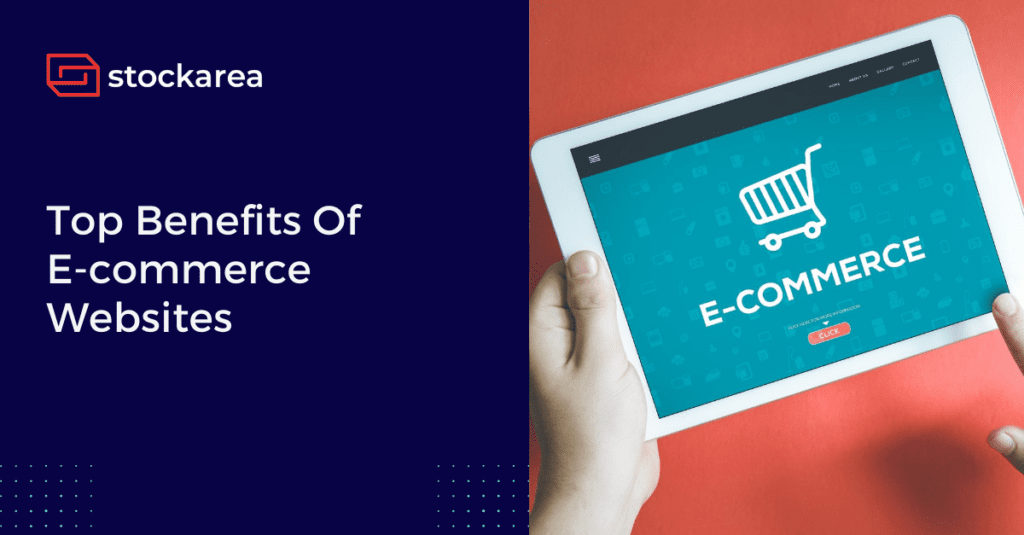Where most clients choose to shop from the convenience of their own homes, the internet market is thriving in today’s ecommerce environment. Online customers can purchase almost anything with only a few clicks. Shopping online gives consumers access to a vast array of items, brands and stores, allowing them to save time and shop for the lowest price. Because the ecommerce sector is booming, every business owner must have an online presence in order to sell their goods and services.
We have outlined the key advantages of using an ecommerce website to sell your products online.
1. Lower Costs
Cost reduction is one of the key benefits of ecommerce websites that keep sellers engaged in online selling. Retailers have to pay a lot of money to run their physical stores. They pay additional upfront expenditures such as rent, repairs, store design, merchandise, and so on. Physical stores can often not achieve the targeted profitability and return on investment despite significant investments in services, inventory, maintenance, and labour. Compared to a traditional business, an ecommerce store is less expensive and requires less investment. This is also an excellent option for individual and small-scale vendors who wish to make money but lack the necessary start-up funding.
2. Removes Geographical Barriers
If you run a physical store, you are limited geographically where you can sell your products. When you operate an e-commerce website, you get to offer your products to the entire world. People can purchase your products via online advertisements or smartphone applications. Additionally, ecommerce has enabled sellers to minimize friction points and made it easier for buyers to purchase things from any source, from any location. An ecommerce website is accessible from the comfort of your own home, allowing for easy management of the business and the sale of products to clients worldwide.
3. Quick Sales
In contrast to traditional retail methods, an ecommerce website can be set up in just a few clicks. There are a vast number of platforms available, such as Shopify and Squarespace, from which you can build your store using pre-made themes. Some of the services provided by these platforms include hosting, maintenance, and PCI compliance. The only thing a customer has to do to buy your products is to visit your store, browse through it, and click to place an order for the products.
4. Broader Customer Reach
With an ecommerce website, your items are available to customers all over the world. In addition to increasing your online sales, an ecommerce website will allow you to connect with a new set of potential customers. Ecommerce sales come in a variety of forms. Sellers connect with a different audience on each and every channel. An internet presence can help a business contact customers throughout the world. Using social media may open a company up to a whole new set of customers. Using several web touchpoints, a business may communicate and engage with a wide range of diverse audiences.
5. Customer Data Insight
Another benefit of selling products online is the ease of collecting, measuring, and acting upon data. An ecommerce website allows you to collect first-hand data by tracking how clients engage with your online shop. The data gives you insights on improving the user experience and increasing sales of your ecommerce business. The ability to track client interactions allows you to identify and perfect feedback loops of any actionable insights, which will help in improving your customer experience.
6. Several Payment Modes
Buyers enjoy personalization, and the same is true when paying for their orders. The payment options accepted by your ecommerce store include internet banking, credit/debit cards, payment wallets, UPI (Unified Payments Interface), and cash on delivery (COD). As a result, customers can choose their preferred method of payment from a number of options, lowering card abandonment and increasing revenue for your business.
7. Comprehensive Product Catalogue
A product display page allows you to provide as much information about your product as you like. Furthermore, ecommerce websites offer lots of room to display product diversity, from colours to details, sizes, and materials, all of which are difficult to perform in physical stores. Online retailers can also post their items on social media, where customers can interact with your products and feel more connected with your brand.
8. Scalability
E-commerce websites are pretty helpful in allowing you to determine which products are selling well and ensuring that the stock levels of these products are maintained and monitored. This allows you to expand your business in sales, customer base, and profit margins, among other aspects. Scaling the product range and regularly monitoring of sales with customers have been the keys to the success of a number of ecommerce shopping platforms. Thus, they have been able to significantly expand their product line across a wide range of industries.
Conclusion
In short, establishing an ecommerce website is more accessible, cheaper, and less risky than setting up a physical store. The internet can provide a passive income and a high return on investment in the long term if you have a solid business plan and products that meet your customers’ needs.
Related posts
- What is Ecommerce Shipping?
- How To Sell On Meesho? Ultimate Guide For Beginners
- 10 Proven Tips To Grow Online Business
- How To Increase Ecommerce Sales In 10 Practical Ways
- How To Start Selling On Paytm In 2024
- List Of Top 10 Online Shopping Sites In India
- How To Start Ecommerce Business In India
- How To Sell Products Online: 2024 Ultimate Guide
- What Is An Online Marketplace?
- What Is Dropshipping?
- 10 Key Benefits Of Ecommerce For Your Business
- 15 Must-Have Features For A Successful Online Store
- Why you should start an Ecommerce Business in India
